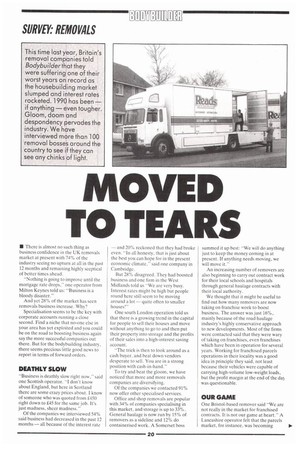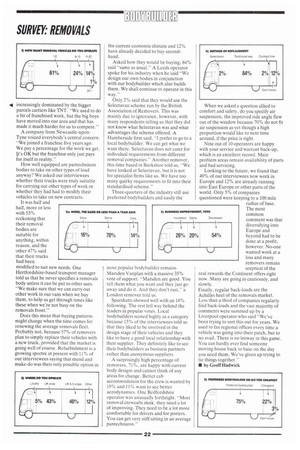MOVED TO TEARS
Page 166

Page 168

If you've noticed an error in this article please click here to report it so we can fix it.
• There is almost no such thing as business confidence in the UK removals market at present with 740/0 of the industry seeing no upturn at all in the past 12 months and remaining highly sceptical of better times ahead.
"Nothing is going to improve until the mortgage rate drops," one operator from Milton Keynes told us: -Business is a bloody disaster."
And yet 28% of the market has seen removals business increase. Why?
Specialisation seems to be the key with corporate accounts running a close second. Find a niche that no-one else in your area has yet exploited and you could be on the road to boosting business again say the more successful companies out there. But for the bodybuilding industry, there seems precious little good news to report in terms of forward orders.
DEATHLY SLOW
-Business is deathly slow right now," said one Scottish operator. "I don't know about England, but here in Scotland there are some crazy prices about. I know of someone who was quoted from £450 right down to £45 for the same job. It's just madness, sheer madness."
Of the companies we interviewed 54% said business had decreased in the past 12 months all because of the interest rate — and 20% reckoned that they had broke even. "In all honesty, that is just about the best you can hope for in the present economic climate," said one company in Cambridge.
But 28% disagreed. They had boosted business and one firm in the West Midlands told us "We are very busy. Interest rates might be high but people round here still seem to be moving around a lot — quite often to smaller houses!"
One south London operation told us that there is a growing trend in the capital for people to sell their houses and move without anything to go to and then put their property into storage and the profits of their sales into a high-interest saving account.
-The trick is then to look around as a cash buyer, and beat down vendors desperate to sell. You are in a strong position with cash-in-hand."
To try and beat the gloom, we have noticed that more and more removals companies are diversifying.
Of the companies we contacted 91% now offer other specialised services.
Office and shop removals are popular with 34% of companies specialising in this market, and storage is up to 33%. General haulage is now run by 15% of removers as a sideline and 12% do containerised work. A Somerset boss summed it up best: "We will do anything just to keep the money coming in at present. If anything needs moving, we will move it."
An increasing number of removers are also beginning to carry out contract work for their local schools and hospitals through general haulage contracts with their local authority.
We thought that it might be useful to find out how many removers are now taking on franchise work to boost business. The answer was just 16%, mainly because of the road haulage industry's highly conservative approach to new developments. Most of the firms were contacted said that they were wary of taking on franchises, even franchises which have been in operation for several years. Working for franchised parcels operations in their locality was a good idea in principle they said, not least because their vehicles were capable of carrying high-volume low-weight loads, but the profit margin at the end of the da) was questionable.
OUR GAME
One Bristol-based remover said "We are not really in the market for franchised contracts. It is not our game at heart." A Lancashire operator felt that the parcels market, for instance, was becoming
.14 increasingly dominated by the bigger parcels carriers like TNT. "We used to do a bit of franchised work, but the big boys have moved into our area and that has made it much harder for us to compete."
A company from Newcastle-uponTyne voiced everybody's central concern. "We joined a franchise five years ago. We pay a percentage for the work we get. It's OK but the franchise only just pays for itself in reality."
How well equipped are pantechnicon bodies to take on other types of load anyway? We asked our interviewees whether their trucks were truly suitable for carrying out other types of work or whether they had had to modify their vehicles to take on new contracts.
It was half and half, more or less with 53% reckoning that their removal bodies are suitable for anything, within reason, and the other 47% said that their trucks had been modified to suit new needs. One Hertfordshire-based transport manager told us that he never specifies a removals body unless it can be put to other uses. "We make sure that we can carry out other work in our vans when we buy them, to help us get through times like these when we're not busy on the removals front."
Does this mean that buying patterns might change when the time comes for renewing the average removals fleet. Probably not, because 57% of removers plan to simply replace their vehicles with a new truck, provided that the market is going well of course. Refurbishment is a growing spectre at present with 11% of our interviewees saying that mend and make-do was their only possible option in the current economic climate and 12% have already decided to buy secondhand.
Asked how they would be buying, 84% said -same as usual." A Leeds operator spoke for his industry when he said -We design our own bodies in conjunction with our bodybuilder which also builds them. We shall continue to operate in this way."
Only 2% said that they would use the Selectavan scheme run by the British Association of Removers. This was mainly due to ignorance, however, with many respondents telling us that they did not know what Selectavan was and what advantages the scheme offered. A Humberside firm said, "I prefer to go to a local bodybuilder. We can get what we want there. Selectavan does not cater for individual requirements from different removal companies." Another remover, this time based in Berkshire told us. -We have looked at Selectavan, but it is not for specialist firms like us. We have too many quirky requirements to fit into their standardised scheme."
Three-quarters of the industry still use preferred bodybuilders and easily the
most popular bodybuilder remains Marsden Vanplan with a massive 35% vote of support. -Marsden are good. You tell them what you want and they just go away and do it. And they don't rust," a London remover told us.
Sparshatts showed well with an 18% following. The rest fell way behind the leaders in popular votes. Local bodybuilders scored highly as a category because 15% of the interviewees told us that they liked to be involved in the design stage of their vehicles and they like to have a good local relationship with their supplier. They definitely like to see their bodybuilders as business partners rather than anonymous suppliers.
A surprisingly high percentage of removers, 71%, are happy with current body designs and cannot think of any areas for change. Better cab accommodation for the crew is wanted by 19% and 11% want to see better aerodynamics. One Bedfordshire operator was unusually forthright. "Most removal crewcabs stink, they need a lot of improving. They need to be a lot more comfortable for drivers and for porters. You can get very stiff sitting in an average pantechnicon." When we asked a question allied to comfort and safety, do you specify air suspension, the improved ride angle flew out of the window because 70% do not fit air suspension as yet though a high proportion would like to next time around, if the price is right.
Nine out of 10 operators are happy with your service and warrant back-up, which is an excellent record. Main problem areas remain availability of parts and bad servicing.
Looking to the future, we found that 40% of our interviewees now work in Europe and 12% are already running into East Europe or other parts of the world. Only 5% of companies questioned were keeping to a 100 mile radius of base. The most common comment was that diversifying into Europe and beyond had to be done at a profit, however. No-one wanted work at a loss and many removers remain sceptical of the real rewards the Continent offers right now. Many are going in cautiously, and slowly.
Finally, regular back-loads are the Achilles heel of the removals market. Less than a third of companies regularly find back-loads and the vast majority of comments were summed up by a Liverpool operator who said "We've been trying to sort this out for years. We used to fax regional offices every time a vehicle was going into their patch, but to no avail. There is no leeway in this game. You can hardly ever find someone moving house back to base on the day you need them. We've given up trying to tie things together."
• by Geoff Hadwick
IP






















































































































































































